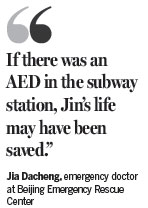Simple device could save heart-attack victims, experts say
Updated: 2016-07-04 08:16
By Wang Xiaodong(China Daily)
|
|||||||||
The sudden death of a man who had a heart attack at a Beijing subway station has aroused public calls for making critical first aid equipment available in public places after attempts to revive him failed.
Jin Bo, 34, an editor at tianya.com, an online forum, fainted and fell on a subway platform on Wednesday evening. He did not recover despite attempts by several passengers to save him, according to a report in Beijing News.
Jin was taken to a nearby hospital half an hour later, but doctors said he was dead, the report said.
A video circulating online showed that several passengers tired to give Jin cardiopulmonary resuscitation, while a subway employee made calls, but the man remained motionless.
According to a netizen named Ye Ying, who described himself in a micro blog as an emergency doctor, the video shows that the passengers who tried to save Jin didn't use the correct technique for cardiopulmonary resuscitation, as they did not press Jin's chest fast enough or long enough.

Ye said an automatic external defibrillator, known as an AED, is the most effective way to revive a person experiencing cardiac arrest.
The device delivers an electric shock that can restart the heart. Subway stations should be equipped with AEDs and staff members should be trained to use them, Ye said.
Jia Dacheng, an emergency doctor at Beijing Emergency Rescue Center, said, "If there was an AED in the subway station, Jin's life may have been saved."
The first few minutes are critical for a person whose heart has stopped beating, he said.
Although AEDs are common in public places in some developed countries, such as the United States, they are still rarely seen in China, he said. Beijing's subway system has no AEDs, for example, although units are available at some airports in China.
About 540,000 people suffer cardiac arrest in China every year, and less than 1 percent of them are saved - one-third of the rate in the United States, where AEDs are available more widely, according to a report by Xinhua News Agency. In major US cities, the rate is more than 3 percent.
Yu Ying, an executive for a US hospital group in Beijing who was an emergency doctor at Peking Union Medical College Hospital until 2013, said Jin's death showed a lack of public emergency response capacity in China.
"All public places should be equipped with AEDs, and service staff should get training in cardiopulmonary resuscitation," she said.
Authorities in Beijing will build 50 new emergency rescue stations equipped with AEDs in the city this year, in addition to the current 43, the Beijing Red Cross Society said in April.
wangxiaodong@chinadaily.com.cn
(China Daily 07/04/2016 page4)
Today's Top News
China-UK ties to remain strong despite Brexit: envoy
Gove denies treachery as he pitches to be next PM
Theresa May among British PM hopefuls
Boris Johnson quits party leadership contest
UK parties head for leadership battles
Terrorist attack in Turkey reinforces need for unity
New British PM to be in place by Sept 9
Labour's Jeremy Corbyn loeses no-confidence vote
Hot Topics
Lunar probe , China growth forecasts, Emission rules get tougher, China seen through 'colored lens', International board,
Editor's Picks

|

|

|

|

|

|







